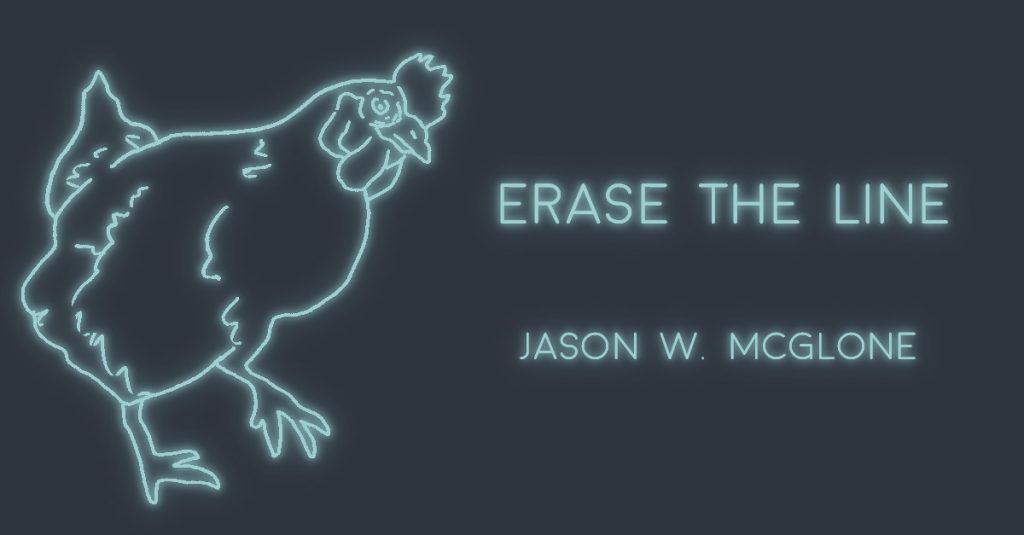I
You need to get away for a day and so do I after the summer we’ve had.
Her thumb runs along narrow chromed plastic embellishments on the steering wheel. She does not smile. I can tell she’s trying hard to sound enthusiastic and I want to appreciate it. I want any feeling, to be honest, but am instead cold, numb as masonite. I think in facts alone now.
My mother is bursting at the seams and I am watching her stitching begin to give. We hurtle past Brooksville.
It’ll be good for you to spend some time with Robby. Been a few years; you always loved running around that big farm with him.
I consider opening the door and rolling to freedom down the embankment lining the double A. It would do nothing good and so the door stays shut.
Anyways, we haven’t been to Aunt Dana’s in such a long time.
There is no Dana, I think, and that makes me smile enough to satisfy her.
II
The casual way you point at the rocks and how your voice doesn’t waver when you say, That’s where we found mah dad tells me we’re not made of the same stuff. You put your arm across my shoulders and add, You probably don’t wanna talk about it. Sorry to hear about your brother, bub.
The arm helps. I imagine the water rushing over your father’s eyes in cold sheets, over and around his body. The bottom of his faulty boot, his wet flannel shirt.
What was it like?
Your eyebrows raise like an adult’s and you blow air. Sucked. Gets a little better. Different. It’s real different.
We do not talk about our dead any more after that.
III
It is alarming in the same way any gun is to any head; that it is Robby, playing, click click click click click click— this makes me feel protected, as if Russian roulette on training wheels is old hat for him.
It is unloaded. Now you.
I can only muster a couple trigger pulls, pointed away from myself, towards the shed window. The sharp feeling of the gun’s dry report in my palm walks with me as we spill back into the woods to find deer sheds and to reset snares. I listen to the creek rush and we steady ourselves with narrow adolescent cottonwoods as we descend the hill.
The sun shines through the leaves and an insectile chorus greets us and I feel the sting of the revolver in my hand. I will remember it forever.
IV
The high hem of your pants as we scare the chickens in the backyard unlocks a joy in me; bunched denim gathers at your knees. You hold a rooster above your head, victorious.
Wanna see a trick?
You stroke the bird’s neck. It gives to your hands, undulates, while his head does not move, as if it’s the axis upon which we all depend. You bring him to the ground, stroking, stroking.
His feathers shine in the evening sun. We’re gonna hypnotize him.
The way you bring the chicken to the earth feels performative, but he likes it. Sometimes we do this so it’s easier to cut their heads off.
The chicken stares and so do we. His eyes are pygmy marbles and he doesn’t seem to breathe. I hold a dried peach pit in my hand and run my thumb over its wrinkled ridges and valleys.
I’m struck by the way you draw a line in the dirt from his beak to the horizon, by the way the chicken is transfixed.
Chop, you mimic with the blade of your hand. Wanna wake him up? Erase the line.
I do.
I’m struck by the chicken’s speed and by the violence its beak is capable of. I’m struck by our own speed in running to the house and by the way you bandage me in your bathroom. Cold water runs over my knuckles and you scrub soap into my wound, repeating please don’t tell my mom under your breath.
This is the last time I tease an animal.
V
I count to the rhythm of amber light over my closed eyes and can hear landscapes in the backdropped sheets of sound. Our mother plays the Commodores and taps on the steering wheel. This multidisciplinary polyrhythm is what I juggle on the drive home, principally to forget.
The night is cold and you aren’t coming back, but Mom and I are here together, remembering you, pretending wordless that it’s all behind us, pretending to sleep. There is no sleep and there is no leaving you behind, not even for a minute.
Some days it feels like you were never even here and that’s a shame. It’s a shame we have to figure out a way to leave you behind. Some days, shame is all there is. The days when you visit are good. Please come more often.

